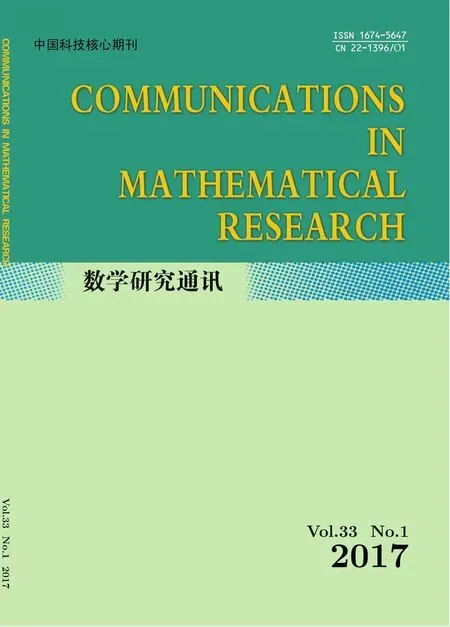L2-harmonic 1-forms on Complete Manifolds
ZHU PENG AND ZHOU JIU-RU
(1.School of Mathematics and Physics,Jiangsu University of Technology, Changzhou,Jiangsu,213001)
(2.School of Mathematical Sciences,Yangzhou University,Yangzhou,Jiangsu,225002)
L2-harmonic 1-forms on Complete Manifolds
ZHU PENG AND ZHOU JIU-RU2
(1.School of Mathematics and Physics,Jiangsu University of Technology, Changzhou,Jiangsu,213001)
(2.School of Mathematical Sciences,Yangzhou University,Yangzhou,Jiangsu,225002)
Communicated by Rong Xiao-chun

minimal hypersurface,end,quaternionic manifold,weighted Poincar´e inequality
1 Introduction

In this paper,frstly,we can obtain the following result:

Remark 1.1Theorem 1.1 generalizes Corollary 2.5 in[6]without the restriction of the second fundamental forms.
Secondly,Lam[7]showed that if M4nis a 4n-dimensional complete noncompact quaternionic K¨ahler and the Ricci curvature of M satisfes

for a positive constant δ,where λ1(M)is the lower bound of the spectrum of the Laplacian on M,then

Suppose that M is a 4n-dimensional complete noncompact quaternionic manifold satisfying the weighted Poincar´e inequality with a non-negative weight function ρ(x)and the Ricci curvature satisfes

for a nonnegative continuous function σ(σ0).If ρ(x)=O(),where rp(x)is the distance function from x to some fxed point p and 0<α<2,then H1(L2(M))={0}(see [6]).It is interesting to see if a similar theorem holds without the restriction of growth rate of the weight function.The following theorems had been established:
Theorem 1.2Suppose that M is a 4n-dimensional complete noncompact quaternionic manifold satisfying the weighted Poincar´e inequality with a non-negative continuous weight function ρ(x)(ρ(x)is not identically zero).Assume that the Ricci curvature satisfes

Theorem 1.3Suppose that M is a 4n-dimensional complete noncompact quaternionic manifold satisfying the weighted Poincar´e inequality with a non-negative continuous weight function ρ(x).Assume that the Ricci curvature satisfes


then

2 One End Theorem on Hypersurfaces in Rn+1
In this section,we give the proof of Theorem 1.1.


Proof of Theorem 1.1First,a complete minimal hypersurface inRn+1is noncompact. For any point p∈M and any unit tangent vector v belonging to tangent space at p,we can choose an orthonormal frame{e1,e2,···,en}on M at p such that e1=v.Since M is a minimal hypersurface,there has the following inequality:

The Gauss equation implies that

By(2.1)and(2.2),we have

Let ω∈H1(L2(M)).Then h=|ω|satisfes a formula(see[8]):


Integration by parts implies that

for each positive constantϵ1.That is,

By the defnition of minimal δ-stable hypersurfaces,we have that

for each positive constantϵ2.Combining(2.6)with(2.7),we have

where



Thus,(2.8)implies that

Note that

Letting r→+∞,we obtain that h is a constant on M.Since M is a complete noncompact minimal hypersurface inRn+1,it implies that M has infnite volume(see[9]).Thus by (2.11),we have h=0.That is,

Since Mnis a minimal hypersurface ofRn+1(n≥3),each end of M is non-parabolic(see [2])and the number of non-parabolic end of M is bounded from above by dimH1(L2(M))+1 (see[10]).Therefore,M has only one end.
3 Vanishing Theorems on Quaternionic Manifolds
In this section,we give the proofs of Theorems 1.2 and 1.3,respectively.
If M is a quaternionic manifold and ω∈H1(L2(M)),then h=|ω|satisfes a Bochner type formula(see[11]):

Proof of Theorem 1.2Note that RicM(x)≥−αρ(x).Combining with(3.1),we have


That is,

Note that

holds for each positive constantϵ1.Since ρ is weight function,we have

for each positive constantϵ2.By(3.3),(3.4)and(3.5),we get

where



Note that(2.11)holds.Letting r→+∞,we have h is a constant on M.If h is not identically zero,then,by(2.11),the volume of the M is fnite.The weighted Poincar´e inequality implies that


Proof of Theorem 1.3Combining the fact RicM(x)≥−αρ(x)−β with(3.1),we have


That is,

Note that

for each positive constantϵ1.Since ρ is a weight function,we obtain

for each positive constantϵ1.By(3.7),(3.8)and(3.9),we have

where


Note that(2.11)holds.Letting r→+∞,we obtain that

Choosingϵ1,ϵ2→0,we get

It is well known that

for each positive constantϵ3.Substituting(2.9)into(3.14),we get

Letting r→+∞,we have

Letϵ3→0.Then we obtain that

Suppose that there exists ω∈H1(L2(M))such that h is not identically constant.Combining (3.13)and(3.17),we have

which is contradiction with the restriction of λ1(M).Thus,h is constant.By(3.17),we obtain that h is identically zero.Therefore,

[1]Palmer B.Stability of minimal hypersurfaces.Comment.Math.Helv.,1991,66:185–188.
[2]Cao H D,Shen Y,Zhu S.The structure of stable minimal hypersurfaces inRn+1.Math.Res. Lett.,1997,4:637–644.
[3]Cheng X,Cheung L F,Zhou D T.The structure of weakly stable constant mean curature hypersurfaces.Tohoku Math.J.,2008,60:101–121.
[4]Cheng X.On end theorem and application to stable minimal hypersurfaces.Arch.Math.,2008,90:461–470.
[5]Cheng X,Zhou D T.Manifolds with weighted Poincar´e inequality and uniqueness of minimal hypersurfaces.Comm.Anal.Geom.,2009,17:135–154.
[6]Zhu P.L2harmonic forms and the fniteness of ends.An.Acad.Brasil.Ciˆenc.,2013,85(2): 457–471.
[7]Lam K.Results on a weighted Poincar´e inequality of complete manifolds.Trans.Amer.Math. Soc.,2010,362:5043–5062.
[8]Li P,Wang J P.Weighted Poincar´e inequality and rigidity of complete manifolds.Ann.Sci. ´Ecole Norm.Sup.,2006,39:921–182.
[9]Frensel K R.Stable complete surfaces with constant mean curvature.Bull.Braz.Math.Soc. (N.S.),1996,27:129–144.
[10]Li P,Wang J P.Minimal hypersurfaces with fnite index.Math.Res.Lett.,2002,9:95–103.
[11]Kong S L,Li P,Zhou D T.Spectrum of the Laplacian on quaternionic K¨ahler manifolds.J. Diferential Geom.,2008,78:295–332.
A
1674-5647(2017)01-0001-07
10.13447/j.1674-5647.2017.01.01
Received date:Dec.15,2014.
Foundation item:The NSF(11471145,11371309)of China and Qing Lan Project.
E-mail address:Zhupeng2004@126.com(Zhu P).
2010 MR subject classifcation:53C21,54C42
 Communications in Mathematical Research2017年1期
Communications in Mathematical Research2017年1期
- Communications in Mathematical Research的其它文章
- Trees with Given Diameter Minimizing the Augmented Zagreb Index and Maximizing the ABC Index
- Bonnesen-style Isoperimetric Inequalities of an n-simplex
- 2N+1-soliton Solutions of Boussinesq-Burgers Equation
- The Value Distribution and Normality Criteria of a Class of Meromorphic Functions
- Multiplicative Jordan Decomposition in Integral Group Ring of Group K8×C5
- Endpoint Estimates for Commutators of Fractional Integrals Associated to Operators with Heat Kernel Bounds
